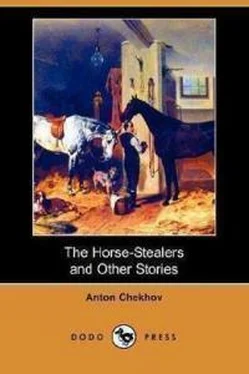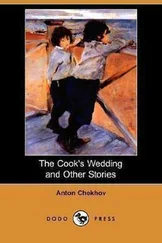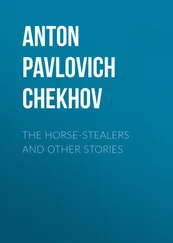The Horse-Stealers and Other Stories
Anton Chekhov
A HOSPITAL assistant, called Yergunov, an empty–headed fellow, known throughout the district as a great braggart and drunkard, was returning one evening in Christmas week from the hamlet of Ryepino, where he had been to make some purchases for the hospital. That he might get home in good time and not be late, the doctor had lent him his very best horse.
At first it had been a still day, but at eight o'clock a violent snow–storm came on, and when he was only about four miles from home Yergunov completely lost his way.
He did not know how to drive, he did not know the road, and he drove on at random, hoping that the horse would find the way of itself. Two hours passed; the horse was exhausted, he himself was chilled, and already began to fancy that he was not going home, but back towards Ryepino. But at last above the uproar of the storm he heard the far–away barking of a dog, and a murky red blur came into sight ahead of him: little by little, the outlines of a high gate could be discerned, then a long fence on which there were nails with their points uppermost, and beyond the fence there stood the slanting crane of a well. The wind drove away the mist of snow from before the eyes, and where there had been a red blur, there sprang up a small, squat little house with a steep thatched roof. Of the three little windows one, covered on the inside with something red, was lighted up.
What sort of place was it? Yergunov remembered that to the right of the road, three and a half or four miles from the hospital, there was Andrey Tchirikov's tavern. He remembered, too, that this Tchirikov, who had been lately killed by some sledge–drivers, had left a wife and a daughter called Lyubka, who had come to the hospital two years before as a patient. The inn had a bad reputation, and to visit it late in the evening, and especially with someone else's horse, was not free from risk. But there was no help for it. Yergunov fumbled in his knapsack for his revolver, and, coughing sternly, tapped at the window–frame with his whip.
"Hey! who is within?" he cried. "Hey, granny! let me come in and get warm!"
With a hoarse bark a black dog rolled like a ball under the horse's feet, then another white one, then another black one—there must have been a dozen of them. Yergunov looked to see which was the biggest, swung his whip and lashed at it with all his might. A small, long–legged puppy turned its sharp muzzle upwards and set up a shrill, piercing howl.
Yergunov stood for a long while at the window, tapping. But at last the hoar–frost on the trees near the house glowed red, and a muffled female figure appeared with a lantern in her hands.
"Let me in to get warm, granny," said Yergunov. "I was driving to the hospital, and I have lost my way. It's such weather, God preserve us. Don't be afraid; we are your own people, granny."
"All my own people are at home, and we didn't invite strangers," said the figure grimly. "And what are you knocking for? The gate is not locked."
Yergunov drove into the yard and stopped at the steps.
"Bid your labourer take my horse out, granny," said he.
"I am not granny."
And indeed she was not a granny. While she was putting out the lantern the light fell on her face, and Yergunov saw black eyebrows, and recognized Lyubka.
"There are no labourers about now," she said as she went into the house. "Some are drunk and asleep, and some have been gone to Ryepino since the morning. It's a holiday…."
As he fastened his horse up in the shed, Yergunov heard a neigh, and distinguished in the darkness another horse, and felt on it a Cossack saddle. So there must be someone else in the house besides the woman and her daughter. For greater security Yergunov unsaddled his horse, and when he went into the house, took with him both his purchases and his saddle.
The first room into which he went was large and very hot, and smelt of freshly washed floors. A short, lean peasant of about forty, with a small, fair beard, wearing a dark blue shirt, was sitting at the table under the holy images. It was Kalashnikov, an arrant scoundrel and horse–stealer, whose father and uncle kept a tavern in Bogalyovka, and disposed of the stolen horses where they could. He too had been to the hospital more than once, not for medical treatment, but to see the doctor about horses—to ask whether he had not one for sale, and whether his honour would not like to swop his bay mare for a dun–coloured gelding. Now his head was pomaded and a silver ear–ring glittered in his ear, and altogether he had a holiday air. Frowning and dropping his lower lip, he was looking intently at a big dog's–eared picture–book. Another peasant lay stretched on the floor near the stove; his head, his shoulders, and his chest were covered with a sheepskin—he was probably asleep; beside his new boots, with shining bits of metal on the heels, there were two dark pools of melted snow.
Seeing the hospital assistant, Kalashnikov greeted him.
"Yes, it is weather," said Yergunov, rubbing his chilled knees with his open hands. "The snow is up to one's neck; I am soaked to the skin, I can tell you. And I believe my revolver is, too…."
He took out his revolver, looked it all over, and put it back in his knapsack. But the revolver made no impression at all; the peasant went on looking at the book.
"Yes, it is weather…. I lost my way, and if it had not been for the dogs here, I do believe it would have been my death. There would have been a nice to–do. And where are the women?"
"The old woman has gone to Ryepino, and the girl is getting supper ready … " answered Kalashnikov.
Silence followed. Yergunov, shivering and gasping, breathed on his hands, huddled up, and made a show of being very cold and exhausted. The still angry dogs could be heard howling outside. It was dreary.
"You come from Bogalyovka, don't you?" he asked the peasant sternly.
"Yes, from Bogalyovka."
And to while away the time Yergunov began to think about Bogalyovka. It was a big village and it lay in a deep ravine, so that when one drove along the highroad on a moonlight night, and looked down into the dark ravine and then up at the sky, it seemed as though the moon were hanging over a bottomless abyss and it were the end of the world. The path going down was steep, winding, and so narrow that when one drove down to Bogalyovka on account of some epidemic or to vaccinate the people, one had to shout at the top of one's voice, or whistle all the way, for if one met a cart coming up one could not pass. The peasants of Bogalyovka had the reputation of being good gardeners and horse–stealers. They had well–stocked gardens. In spring the whole village was buried in white cherry–blossom, and in the summer they sold cherries at three kopecks a pail. One could pay three kopecks and pick as one liked. Their women were handsome and looked well fed, they were fond of finery, and never did anything even on working–days, but spent all their time sitting on the ledge in front of their houses and searching in each other's heads.
But at last there was the sound of footsteps. Lyubka, a girl of twenty, with bare feet and a red dress, came into the room…. She looked sideways at Yergunov and walked twice from one end of the room to the other. She did not move simply, but with tiny steps, thrusting forward her bosom; evidently she enjoyed padding about with her bare feet on the freshly washed floor, and had taken off her shoes on purpose.
Kalashnikov laughed at something and beckoned her with his finger. She went up to the table, and he showed her a picture of the Prophet Elijah, who, driving three horses abreast, was dashing up to the sky. Lyubka put her elbow on the table; her plait fell across her shoulder—a long chestnut plait tied with red ribbon at the end —and it almost touched the floor. She, too, smiled.
Читать дальше












